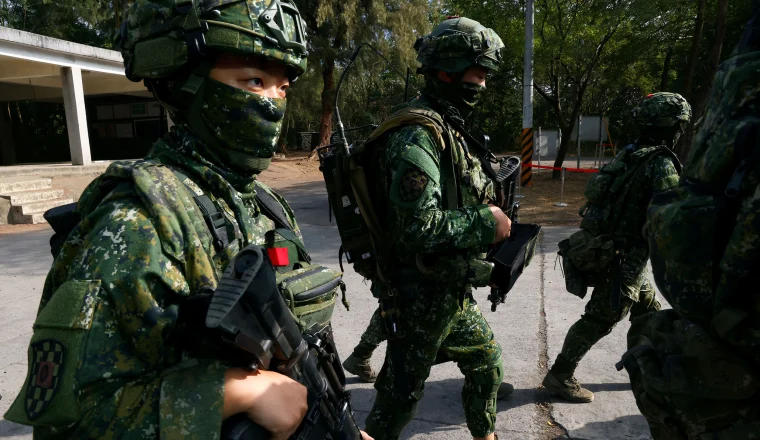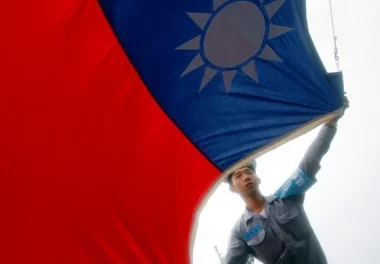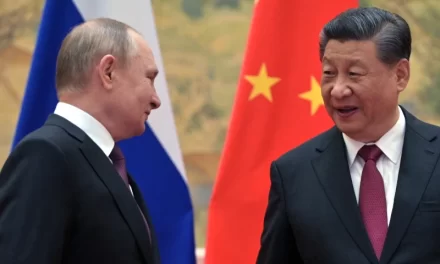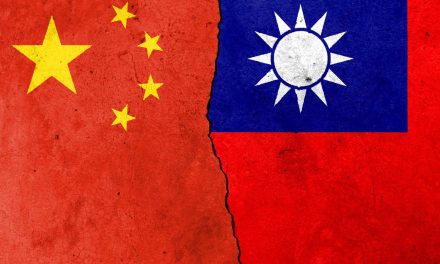By LIANCHAO HAN & JIANLI YANG 05/14/2022
Russia’s invasion of Ukraine has pushed Taiwan to the forefront of geopolitics once again. The U.S. and Europe fear that Communist China will take the opportunity to attack Taiwan by force, while leaders on both sides of the Taiwan Strait insist that Taiwan cannot be compared to Ukraine. Beijing asserts that Taiwan is an internal Chinese matter and that linking it to Ukraine is a Western-created conspiracy about “democracy against dictatorship,” while Taipei emphasizes that it is fundamentally different from Ukraine in terms of its geostrategic and global supply-chain importance. We believe there is a real danger that Chinese Communist Party chief Xi Jinping will essentially “Ukrainize” Taiwan, and the international community must guard against it.
Vladimir Putin ordered the invasion of Ukraine on the grounds of protecting Russians who were subjected to so-called “genocide” in Ukraine, NATO’s expansion to the east, and the need to “demilitarize” and “denazify” Ukraine. These justifications are untenable excuses for aggression against Ukraine. Russia’s aggression is in essence a blatant abandonment of the principle of the prohibition of the use of force to resolve international disputes among nation-states, as stipulated in the U.N. Charter, and it is a crime according to the Rome Statute establishing the International Criminal Court.
Xi Jinping is an accomplice to Putin’s war of aggression and the mastermind in undermining the existing liberal world order. Xi has greatly increased his military intimidation of Taiwan since coming to power. On the same day that Putin invaded Ukraine, nine Chinese military planes violated Taiwan’s air-defense identification zone. This was definitely not a coincidence, but a provocation orchestrated in tandem with Russia.
Judging from Xi’s behavior since coming to power, we believe that regardless of the outcome of the war in Ukraine, Xi will not change his mind about an armed attack on Taiwan, and it is only a matter of time before he moves against Taiwan. The chances of Xi launching a military operation to invade Taiwan in the latter part of his third term are relatively high. This is because Xi has vowed to annex Taiwan as the CCP’s “historic mission and an unshakable commitment,” and has already ordered his military to accelerate war preparation by achieving the People’s Liberation Army’s centenary goal of “liberating Taiwan” by 2027.
For the CCP, regime security is at the epicenter of its core interests, and if an attack on Taiwan would lead to the collapse and change of its own regime, the CCP would certainly think twice before doing so. Therefore, the most effective means of preventing the Ukrainization of Taiwan is to create a new dynamic: A potential CCP invasion in the Taiwan Strait would need to directly threaten the security of the CCP regime. This requires, first and foremost, that the United States and the West be firm and clear in their resolve to defend Taiwan. Putin’s boldness to invade Ukraine is mainly attributable to the weak will of Europe and the U.S. to defend the country; the invasion was seen to carry acceptable risks.
It is commendable that President Biden sent a delegation of former top military and security officials headed by Admiral Mullen, former chairman of the U.S. Joint Chiefs of Staff, to Taiwan on February 28 to demonstrate America’s determination to defend Taiwan. At the same time, Mullen reiterated his opposition to unilateral changes to the status quo in the Taiwan Strait. But this was not enough to deter the CCP from militarily attacking Taiwan, especially after President Biden has twice publicly stated that the U.S. would defend Taiwan in the event of an invasion by the CCP but was subsequently contradicted by his own team. Ambiguous and contradictory messages by the U.S. top brass would give the totalitarian regime in Beijing an opportunity to take advantage of them. It is clear that the United States will continue its established one-China policy and “strategic ambiguity” toward Taiwan.
The one-China policy gives Beijing a strong legal basis to assert that the Taiwan issue is an internal Chinese affair in which no country may interfere, and that the U.N. Charter’s prohibition on the use of force between states to settle international disputes does not apply. Preventing the Ukrainization of Taiwan requires abandoning the one-China policy and internationalizing the Taiwan issue. Indeed, Taiwan (Republic of China) has always been a sovereign state, a founding member of the United Nations, and for more than 73 years China has never exercised effective control over Taiwan. Xi Jinping’s frequent military provocations against Taiwan in recent years are meant to change the status quo, create a legal dispute of Taiwan’s statehood, prevent the West from granting Taiwan normal state status, and thus force “peaceful” or armed unification. The free world must abandon the one-China policy and formally include Taiwan in the international community by recognizing the country. In doing so, the West would make clear that Taiwan and China are like Ukraine and Russia. Xi Jinping’s attack on Taiwan would be the equivalent of Putin’s invasion of Ukraine and equally unacceptable in terms of international law.
It is also crucial for the U.S. to draw a clear redline — strategic clarity — on Taiwan to prevent the island’s Ukrainization. The U.S. passed the Taiwan Relations Act in 1979 after cutting off diplomatic ties with the Republic of China, promising that the U.S. would “maintain the capacity of the United States to resist any resort to force or other forms of coercion that would jeopardize the security, or the social or economic system, of the people on Taiwan,” and subsequently President Reagan made “six assurances” and called for arms sales for Taiwan’s defense. But these are not binding obligations under international law, but rather unilateral commitments. The unilateral commitment is unreliable in light of the disproportionate gap between Taiwan’s defensive capacity and China’s vast military power. It is increasingly clear that the U.S. policy of “strategic ambiguity” is not conducive to preventing the Ukrainization of Taiwan.
President Tsai Ing-wen has called for Taiwan to strengthen its defenses against cognitive warfare (actions aimed to alter people’s perceptions) waged by forces outside the country, and their local collaborators, to counter China’s threat. She is right. One of Putin’s main pretexts for invading Ukraine was to protect Russians in Donetsk and Luhansk and support their separation from Ukraine. Over the past decades, Communist China has penetrated deeply into Taiwanese society by bribing some of its elites to become influencers to help with the CCP’s narratives in their public discourse. With this new strategy, Beijing intends to brainwash the people of Taiwan. To the degree possible in view of human-rights principles, Taiwan should pass tougher laws to crack down on the activities of pro-China elements, to prevent them from splitting the country from within and making excuses for Xi Jinping to invade Taiwan.
The international community should also take steps to support the decoupling of Taiwan’s economy from China’s. This is because the party-state has already succeeded in creating a dependence of Taiwan’s economy on the mainland. In 2021, Taiwan’s exports to the mainland accounted for 42.3 percent of its total exports, and its trade surplus broke $100 billion, a record high. The deeper Taiwan’s economic and trade ties are with China, the greater the chance of Taiwan being hijacked by Beijing. If Taiwan cannot break away from its economic dependence on China, it will be easy for Xi to annex Taiwan.
This article first appeared in National Review on March 14, 2022
























